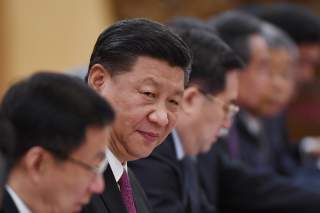China and the Cult of Xi
Some Chinese citizens are pushing back against the country's new "emperor."
The glorification of Xi Jinping is getting so out-of-control it might even be too much for the Chinese Communist Party to handle.
Social-media protests were sparked around the country after a woman was arrested in Shanghai for vandalizing a roadside propaganda poster. She broadcast herself on Twitter splashing Xi’s face with a bucket of black ink.
In China today, it is almost impossible to walk a few hundred meters without passing by a propaganda mural about “socialist values” or one featuring President Xi’s face. Other Chinese citizens, similarly concerned about Xi’s consolidation of power, have defaced propaganda and posted photos of themselves protesting Xi in solidarity. This comes four months after overseas Chinese students posted “Not My President” signs following Xi’s reform of the constitution to allow himself to serve for life.
Discomfort with the cult of Xi is present among the public and even the party to some degree. Local governments as well as the central government struggle over how far to go in advancing Xi Jinping’s image as a strong leader of a renewed China without crossing into dangerous territory evoking Cultural Revolution-style excesses.
A local Guizhou party newspaper began utilizing a few of the titles of the Mao-era and present-day North Korean press to describe Xi, calling him their “great leader” in November 2017, before a province-level propaganda official demanded it stop, Hong Kong media reported.
In May, the Yan’an municipal government hosted an event where it promoted Liangjiahe, a brand of apples and foodstuffs named after a village where Xi was sent to work during the Cultural Revolution. Besides apples, the brand also produces sorghum, bottled water, rice, and liquor. Yan’an was the destination the Communists marched to in 1935 to escape the Kuomintang, and Liangjiahe is located within one of the thirteen counties administered by Yan’an. Liangjiahe has been heavily promoted by the party the past few years, with Xi calling it “a place that others should study.”
But Chinese citizens and overseas Chinese found idea of the brand comical and mocked it online in early July. Reflecting much sentiment, one netizen posted, “Cultural Revolution for a New Era,” a jibe at Xi’s “Thought on Socialism with Chinese Characteristics for a New Era.”
Now unverified reports have been reported by the Hong Kong bureau of the Central News Agency, Taiwan’s official state-owned news agency, that the Chinese Communist Party has put out a notice banning any provincial or local officials from hanging Xi’s portrait without approval from the central government. The network interviewed Liu Silu, a Hong Kongese analyst, who speculated that the reason was to make its propaganda less excessive and avoid offending victims of the Cultural Revolution. The Chinese government appears to want future generations to be in the dark about that period, as references to the ten years of chaos are being excised and shortened in textbooks.
The CNA’s article, by Zhang Qian, acknowledged that the basis of the reports were rumors, and the extent of anti-Xi protests is hard to quantify. But when one leader consolidates power so aggressively, whether out of arrogance or to mask internal divisions, it is not always easy to maintain stability for too long.
Mitchell Blatt is an editorial assistant at the National Interest, Chinese-English translator, and lead author of Panda Guides Hong Kong. He has been published in The Korea Times, Silkwinds magazine, and Areo Magazine, among other outlets. He tweets at @MitchBlatt.
Image: Chinese President Xi Jinping looks on during a meeting with Russian President Vladimir Putin (not seen) in the Great Hall of the People in Beijing, China June 8, 2018. Greg Baker/ Pool via REUTERS

